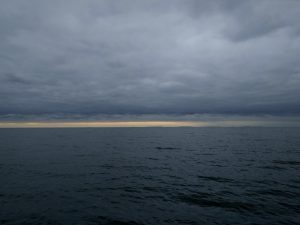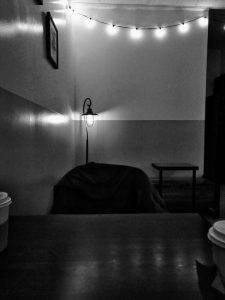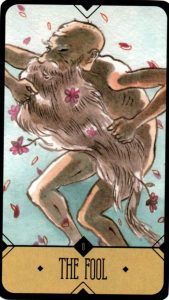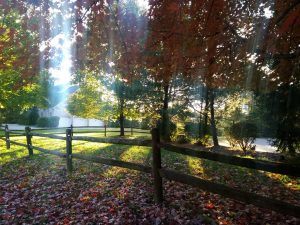by Lexi Lerner
 “They all go the same way. Look up, then down and to the left,” the EMT said. “Always.”
“They all go the same way. Look up, then down and to the left,” the EMT said. “Always.”
Why?
“I don’t know,” he said. “Well – I think they know. When they look up, they’re just… waiting.”
And the next part – why to the left? Because of the heart?
“I don’t know. Maybe something with blood pressure differences. Maybe something else. I really don’t know.”
I’m not living, I’m just killing time.[1]
It’s absurdly easy to take this life for granted. It’s so easy that I want to, so badly, all the time. The pitfall was built into its coding. So was the challenge: if I let life matter more, I choke.
What’s the worth of sitting in the grass, watching geese, or perhaps fireflies, for days or decades on end? Is it worthy of a lifetime? Where were the geese in my college classrooms? Where were the fireflies at my jobs? What’s the role of ambition? Ambition to do what?
We sat on a bench in Soho, watching a pickup kickball game.
“Is this fragile?” I asked her.
She looked through the chain link fence. The rubber ball sailed across the field; all heads followed its enormous arc. Both teams cheered heartily.
“Yes,” she said.
“Is it sacred?” I asked.
The bruised shadows of trees, the emperor sun behind them, the pigeons.
“Yes,” she said.
On a sun-spotted afternoon in a forest, I asked my dad if he missed his dad, who passed a few years ago.
Sometimes, it doesn’t really feel like he’s gone. More like, I haven’t seen him in a while, and we haven’t spoken in a while, but he’s just a phone call away. I find myself thinking, where’s Pa? Where is he?
There are moments, walking, when I catch a glimpse of myself in the window glass, say, the window of the corner video store, and I’m gripped by a cherishing so deep for my own blowing hair, chapped face, and unbuttoned coat that I’m speechless. I am living. I remember you.[2]

In a way, the main difference between death and never seeing someone again is if you want to call them, you can’t.
But we can kill people off within our reality without them physically dying. A relative death: “You’re dead to me.” Our willingness to do this and forsake any possibility of reconciliation is the saddest human grudge of all.
But causes and conditions don’t let us die to each other like that. Water striders who have never met still feel all footprints through the pond’s ripples. And switching from a horizontal to vertical view – the ghosts of history live with us, are here in every moment, and they direct what we do, invisibly guiding our pens and swords, more influential and alive today than they ever were in life.

In the classic Rider-Waite deck, the Fool brings the Major Arcana full circle and serves as its implicit protagonist. He’s a young man with a white dog, a white rose, and a bindle, arms outstretched in the sunlight, about to walk over the edge of a cliff.
My favorite version of the Fool comes from a much more modern deck, the Sasuraibito created by Stasia Burrington. What makes this man foolish? Did age not render him wise? I hear Socrates’ sentiment echo through the ages: You call me wise because I know that I know nothing. Foolishness is foolishness, but wisdom is the recognition of foolishness. We don’t know what kind of fool this old man is, whether he’s flower-dancing in ignorance or enlightenment. But they are obverse and reverse of each other, which is both the furthest and closest they are capable of being.
The elderly become a series of checklists – where to house them, in what nursing home, how to liquidate their assets, what insurance. They become fleshy, financial burdens rather than themselves. Something for us to clean up and deal with.
And so we neglect the gorgeously mundanities of growing old, and the intimate rituals involved.
Christ will be present in all the skills that we learn and in symbols and sacraments of all kinds. These will include the sacraments of the cup of cold water and the washing of the disciples’ feet. All these things will speak silently to the patients about God’s love for them.[3]

On a run through my hometown, I passed a doe on the side of the road. She was lying on her side, the sun-turned eye wide open, the fur of her body pristine, legs pulled together as if someone had dragged her off the road, no evidence of coming into contact with a car or a disease, no gnats or maggots. It was a busy road, so I needed to run past her, and my headphones were playing some sort of pop music, so I tried to recite a Mourner’s Kaddish as I left, but it was like fighting the wind, singing against the wind of the saccharine beat, and the run, and the cars scraping against the shoulder of the road, always threatening… but I had this deep, human urge to dig a trench into the earth and bury her, maybe even on that property, with the colonial house, didn’t matter, better farther from the road, I just wanted her buried. And why. It wasn’t a matter of decency, that embarrassed, sick feeling one gets when seeing a dead thing, a thing that we think isn’t supposed to be seen – because seeing it brings us closer to it, makes it real, puts it in the purview of this living realm. And it obviously wasn’t a matter of hygiene. The urge was different. It was a return. Biological obligation, a doctor once called it. The sense that we’re supposed to be in the ground, and help each other be in the ground, to be sunken in the warm-cool dirt, its softness and hardness. Returning. That the earth consumes us and will metabolize us into fodder for new things, and we become those new things. We’re supposed to bury each other into earth, it’s a mitzvah, both goodness and law; that’s why mausoleums are creepy, that’s why even when we turn to cinders in cremation, many of us release each other into the wind rather than bottle it up. It’s a returning. We’re supposed to return. I know the doe will return. Creatures will take her fur, her meat, her bones. But I didn’t bury her. One eye stared at heaven while I ran away.
 On another recent hometown adventure, the road took me over the river. So I paused and leaned on the bridge banister to watch the water flow underneath me into the woods.
On another recent hometown adventure, the road took me over the river. So I paused and leaned on the bridge banister to watch the water flow underneath me into the woods.
The undulating reflection of the tree – I realized it was the water’s understanding of the tree rather than the tree itself. The water is like the medium of our mind, which can be affected by externalities: debris in the river versus trauma, delights, idiosyncrasies that we embody. And these diversions, artifacts, alter how the river and mind perceive and respond to stimuli. In other words, these externalities form the personality of the river, and the personality of the mind, a filter through which all things are reinterpreted rather than seen as they are in perfect mirroring. And this personality outputs reflections in the water and thoughts in the mind, subject to change by more externalities and different object stimuli.
When the water stilled for just a moment, I could distinguish the water from the tree from the reflection of tree in water, and recognize their mediums. And I thought -maybe it is possible to do this with the mind, and objects, and thoughts about objects.
It’s a spin-off of Plato’s cave, sure. But there’s another sinister layer at work.
Once you can see the medium of your mind, you can see that delights, traumas, idiosyncrasies – the things we cling to, that give us individuality – are just sticks and stones in our water that affect perception. Personality, indeed, is the nature of our water’s reflection, the way our water responds to what’s around it, based on how we interrupt its flow. So you have the power to undo yourself and induce total ego death.
That’s terrifying alchemy. As painful as those traumas may be, we cling to so many of them because they’re part of what we think makes us us. In an actor’s first practice, they learn to recognize the daily performance they pull. All personality is performance – to remind us that we’re unique, special, and. Personality renders us archetypal, iconic. And the possibility of just facing our own pure water is like undoing selfhood in a sensory deprivation tank. The question isn’t just can you undo yourself; it’s – what would happen if you did? And why on earth would you want to?
I start medical school in nine months, the amount of time it takes to birth someone new. But it will take mother’s life then, too. This is what I’m afraid of. This “I” doesn’t want to let go. I don’t want to go.
“Have you ever been on a super high diving board? So high you feel it wobble in the wind? With water so dark and deep you can’t see the bottom. And your toes curl around the edge. And you can feel your pulse in your ears.”
“Yes.”
“The trepidation right before you jump. But you know you will.”
“Yes.”
“I almost never tell people what to do,” the sensei said. “But I’m only telling you because you already know.” Catching my eyes. “Right?”
Yes. I knew I needed to study at the monastery.
“So -” he opened his hands “- jump. This is your sign. What are you waiting for?”
I don’t know.
My toes are still curled around the edge.
Being in a zendo sometimes feels like being totally alone at a crowded party. You have to exist there in deafening, deadened silence, and not fall apart.
But you’re not alone. You’re in the heart of the room. Everyone surrounding you is also silen(t/ced) in their own way. Maybe one of them, like you, has tears in their throat.
In Buddhism, one of the things you take refuge in is the sangha: the harmony, the community. And here it is, all around you. You commune with everyone breathing and not breathing, everyone here and not here, everyone on the edge of existing and not existing at the drop of a hat.
And then the air shifts.
He looked at me as though he couldn’t speak, as if there were a law against it, a membrane he couldn’t break… the level look that wants to tell you something, in a crowded room, something important, and can’t.[4]
Often it is important that very little should be said at all because it is so easy to interrupt a real message.[5]
4AM, in whispers, so as not to awaken the words underneath:
I see the lake and the sunburst of trees around it, all the colors of fire. Leaves like golden raindrops fluttering. And the water, with its disturbed glass. Waiting for the sun.
– What did you learn from this?
That activity and stasis are more connected than we think. That falling leaves are part of the still picture.
– If you could live like that forever, would you?
I think my life’s work is figuring out how to fall in love with each moment. Even when it’s not autumn.
10AM, in a bed in Brooklyn I will no longer sleep in, I hear what death sounds like.
It starts just outside the room’s only window, where all the pigeons roost in the rooftop nook, in silence.
Then a flurry of wings, feathers turned to engines.
Out. Away.
An airplane rolling against the ceiling of sky.
The dark’s dust lingering in the room.
You asleep and me awake, breathing, writing, but with nothing more to say.
[1] Radiohead, “True Love Waits”
[2] Marie Howe, “What the Living Do”
[3] Dame Cicely Saunders, “Watch with Me: The Founding of St. Christopher’s Hospice”
[4] Marie Howe, “The Promise”
[5] Dame Cicely Saunders, “Watch with Me: The Founding of St. Christopher’s Hospice”
